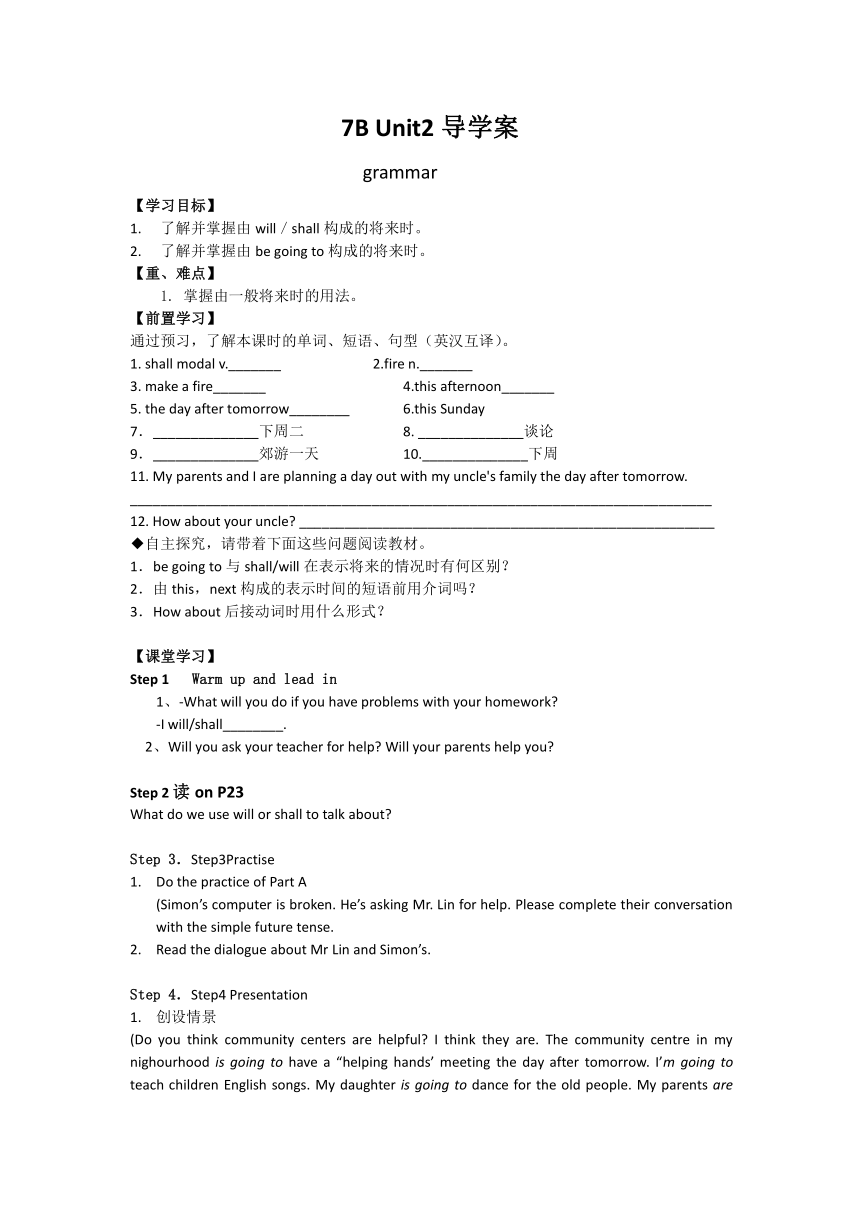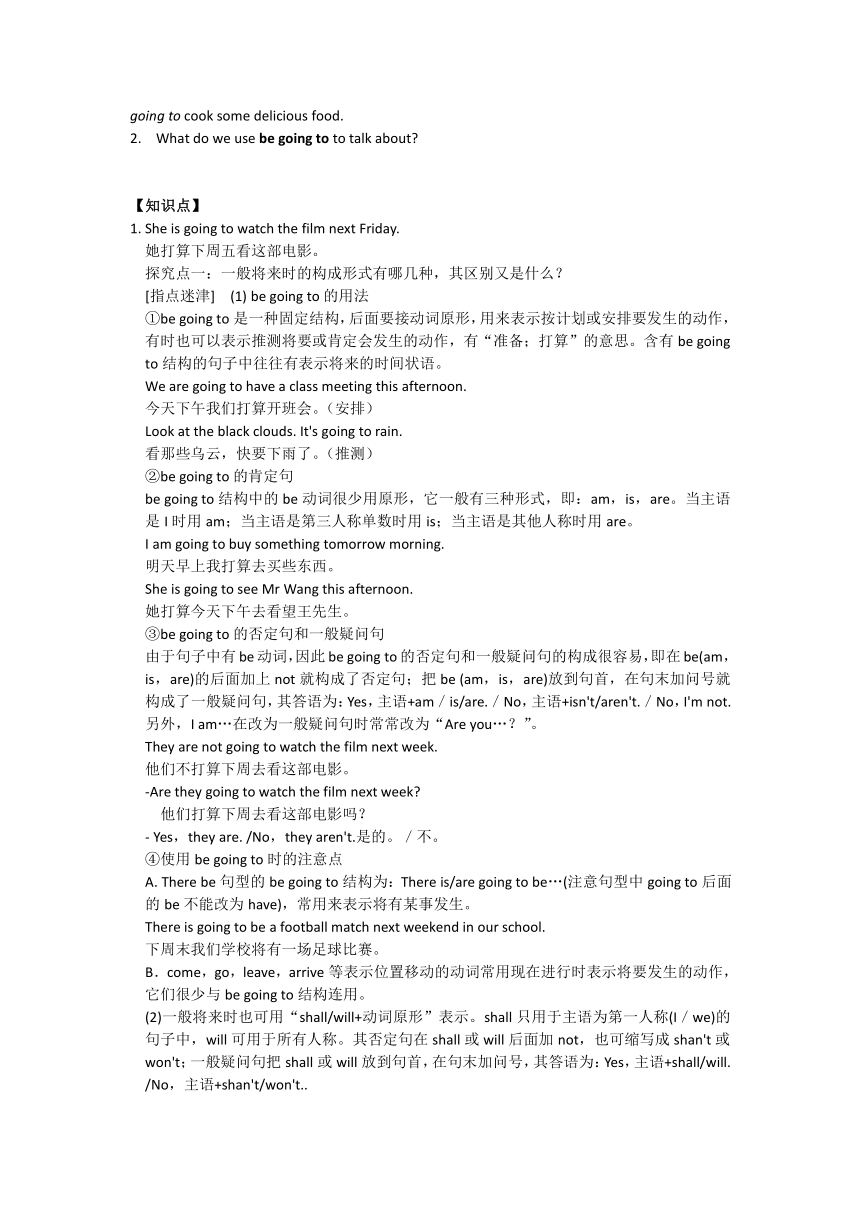译林版七下英语Unit2 Neighbours Grammar导学案(无答案)
文档属性
| 名称 | 译林版七下英语Unit2 Neighbours Grammar导学案(无答案) |  | |
| 格式 | zip | ||
| 文件大小 | 18.9KB | ||
| 资源类型 | 教案 | ||
| 版本资源 | 牛津译林版 | ||
| 科目 | 英语 | ||
| 更新时间 | 2020-03-12 13:30:34 | ||
图片预览


文档简介
7B Unit2导学案
grammar
【学习目标】
了解并掌握由will/shall构成的将来时。
了解并掌握由be going to构成的将来时。
【重、难点】
1. 掌握由一般将来时的用法。
【前置学习】
通过预习,了解本课时的单词、短语、句型(英汉互译)。
1. shall modal v._______ 2.fire n._______
3. make a fire_______ 4.this afternoon_______
5. the day after tomorrow________ 6.this Sunday
7.______________下周二 8. ______________谈论
9.______________郊游一天 10.______________下周
11. My parents and I are planning a day out with my uncle's family the day after tomorrow.
_____________________________________________________________________________
12. How about your uncle? _______________________________________________________
◆自主探究,请带着下面这些问题阅读教材。
1.be going to与shall/will在表示将来的情况时有何区别?
2.由this,next构成的表示时间的短语前用介词吗?
3.How about后接动词时用什么形式?
【课堂学习】
Step 1 Warm up and lead in
1、-What will you do if you have problems with your homework?
-I will/shall________.
2、Will you ask your teacher for help? Will your parents help you?
Step 2读on P23
What do we use will or shall to talk about?
Step 3.Step3Practise
Do the practice of Part A
(Simon’s computer is broken. He’s asking Mr. Lin for help. Please complete their conversation with the simple future tense.
Read the dialogue about Mr Lin and Simon’s.
Step 4.Step4 Presentation
创设情景
(Do you think community centers are helpful? I think they are. The community centre in my nighourhood is going to have a “helping hands’ meeting the day after tomorrow. I’m going to teach children English songs. My daughter is going to dance for the old people. My parents are going to cook some delicious food.
What do we use be going to to talk about?
【知识点】
1. She is going to watch the film next Friday.
她打算下周五看这部电影。
探究点一:一般将来时的构成形式有哪几种,其区别又是什么?
[指点迷津] (1) be going to的用法
①be going to是一种固定结构,后面要接动词原形,用来表示按计划或安排要发生的动作,有时也可以表示推测将要或肯定会发生的动作,有“准备;打算”的意思。含有be going to结构的句子中往往有表示将来的时间状语。
We are going to have a class meeting this afternoon.
今天下午我们打算开班会。(安排)
Look at the black clouds. It's going to rain.
看那些乌云,快要下雨了。(推测)
②be going to的肯定句
be going to结构中的be动词很少用原形,它一般有三种形式,即:am,is,are。当主语是I时用am;当主语是第三人称单数时用is;当主语是其他人称时用are。
I am going to buy something tomorrow morning.
明天早上我打算去买些东西。
She is going to see Mr Wang this afternoon.
她打算今天下午去看望王先生。
③be going to的否定句和一般疑问句
由于句子中有be动词,因此be going to的否定句和一般疑问句的构成很容易,即在be(am,is,are)的后面加上not就构成了否定句;把be (am,is,are)放到句首,在句末加问号就构成了一般疑问句,其答语为:Yes,主语+am/is/are./No,主语+isn't/aren't./No,I'm not.另外,I am…在改为一般疑问句时常常改为“Are you…?”。
They are not going to watch the film next week.
他们不打算下周去看这部电影。
-Are they going to watch the film next week?
他们打算下周去看这部电影吗?
- Yes,they are. /No,they aren't.是的。/不。
④使用be going to时的注意点
A. There be句型的be going to结构为:There is/are going to be…(注意句型中going to后面的be不能改为have),常用来表示将有某事发生。
There is going to be a football match next weekend in our school.
下周末我们学校将有一场足球比赛。
B.come,go,leave,arrive等表示位置移动的动词常用现在进行时表示将要发生的动作,它们很少与be going to结构连用。
(2)一般将来时也可用“shall/will+动词原形”表示。shall只用于主语为第一人称(I/we)的句子中,will可用于所有人称。其否定句在shall或will后面加not,也可缩写成shan't或won't;一般疑问句把shall或will放到句首,在句末加问号,其答语为:Yes,主语+shall/will. /No,主语+shan't/won't..
I shall/will buy a new bike.
我将买一辆新自行车。
They will not/won't stay here too long.
他们不会在这儿呆太久。
I shall not/shan't be late again.
我将再也不迟到了。
- Will you help me with my English?
你将帮助我学英语吗?
- Yes,I will.好的,我将帮助你学英语。
(3) be going to与will
be going to与will两者都可表示将要发生的事、将要去做某事,但它们有如下几点区别:
①be going to表示近期、眼下就要发生的事情;will表示的将来时间则较远一些。
He is going to watch TV tonight.
今晚他打算看电视。
He will write a book one day.
总有一天他将写一本书。
②be going to表示根据主观推测将来肯定发生的事情;will表示客观上将来势必发生的
事情。
The old man is going to die.
那位老人快死了。
He will be twenty years old.他将20岁了。
③be going to含有“计划,准备”的意思,而will则没有这个意思。
She is going to stay here.她打算呆在这儿。
He will be here in half an hour.
他将在半小时内到这儿来。
(4) shall与will
shall用于主语为第一人称(I/we)的句子中,will用于所有人称。
①will/shall表示单纯的将来,常指因为事情的突变而做出的打算。
②will/shall还用在客观事实或真理的句子中。
It will be sunny tomorrow.明天将会是晴天。
①他打算今天下午踢足球。
He_______ _______ _______ _______ football this afternoon.
②明天将是他的生日。
It_______ _______ his birthday tomorrow.
探究点二:next Friday意为“______________”。
[指点迷津] next Friday意为“下周五”。由this,next构成的表示时间的短语前一般不加介词。
What are you going to do this Saturday afternoon?
本周六下午你打算干什么?
( )③We are going to have an English party_______.
A.Sunday B.next Sunday
C. on Sundays D. at weekends
2. My parents and I are planning a day out with my uncle's family the day after tomorrow.
我和我的父母计划后天和我的叔叔一家一起出去郊游。
探究点:plan的意思是“_______”。
[指点迷津] plan的意思是“计划”,既可用作动词又可用作名词,在此用作动词。
They plan to buy another computer.
他们计划再买一台电脑。
What's your new plan?
你的新计划是什么?
我们在计划参观长城。
We_______ _______ _______ _______ the Great Wall.
3.How about your uncle?
你叔叔呢?
探究点:How about后接动词时用什么形式?
[指点迷津] How about后接动词时用-ing的形式,意为“……怎么样?”,相当于“What about…?”。
How about having a rest?
休息一下怎么样?
看足球比赛怎么样?
How_______ _______ the football match?
【巩固练习】
课堂练习
用所给动词的适当形式填空。
1. We_______ (have)a meeting this week.
2. Will they_______ (like) this colour?
3. The doctor_______ (come) to see you next week.
4. He_______ (not sing) an English song next time.
5. How about_______ (make)a fire?
6. She_______ (be) 16 years old next year.
7. - Where_______ you_______ (go)?
- I'm going to Paris,
8._______ it_______ (be) fine the day after tomorrow?
9. He plans_______ (buy) a new house.
10. They_______ (go) shopping this evening.
grammar
【学习目标】
了解并掌握由will/shall构成的将来时。
了解并掌握由be going to构成的将来时。
【重、难点】
1. 掌握由一般将来时的用法。
【前置学习】
通过预习,了解本课时的单词、短语、句型(英汉互译)。
1. shall modal v._______ 2.fire n._______
3. make a fire_______ 4.this afternoon_______
5. the day after tomorrow________ 6.this Sunday
7.______________下周二 8. ______________谈论
9.______________郊游一天 10.______________下周
11. My parents and I are planning a day out with my uncle's family the day after tomorrow.
_____________________________________________________________________________
12. How about your uncle? _______________________________________________________
◆自主探究,请带着下面这些问题阅读教材。
1.be going to与shall/will在表示将来的情况时有何区别?
2.由this,next构成的表示时间的短语前用介词吗?
3.How about后接动词时用什么形式?
【课堂学习】
Step 1 Warm up and lead in
1、-What will you do if you have problems with your homework?
-I will/shall________.
2、Will you ask your teacher for help? Will your parents help you?
Step 2读on P23
What do we use will or shall to talk about?
Step 3.Step3Practise
Do the practice of Part A
(Simon’s computer is broken. He’s asking Mr. Lin for help. Please complete their conversation with the simple future tense.
Read the dialogue about Mr Lin and Simon’s.
Step 4.Step4 Presentation
创设情景
(Do you think community centers are helpful? I think they are. The community centre in my nighourhood is going to have a “helping hands’ meeting the day after tomorrow. I’m going to teach children English songs. My daughter is going to dance for the old people. My parents are going to cook some delicious food.
What do we use be going to to talk about?
【知识点】
1. She is going to watch the film next Friday.
她打算下周五看这部电影。
探究点一:一般将来时的构成形式有哪几种,其区别又是什么?
[指点迷津] (1) be going to的用法
①be going to是一种固定结构,后面要接动词原形,用来表示按计划或安排要发生的动作,有时也可以表示推测将要或肯定会发生的动作,有“准备;打算”的意思。含有be going to结构的句子中往往有表示将来的时间状语。
We are going to have a class meeting this afternoon.
今天下午我们打算开班会。(安排)
Look at the black clouds. It's going to rain.
看那些乌云,快要下雨了。(推测)
②be going to的肯定句
be going to结构中的be动词很少用原形,它一般有三种形式,即:am,is,are。当主语是I时用am;当主语是第三人称单数时用is;当主语是其他人称时用are。
I am going to buy something tomorrow morning.
明天早上我打算去买些东西。
She is going to see Mr Wang this afternoon.
她打算今天下午去看望王先生。
③be going to的否定句和一般疑问句
由于句子中有be动词,因此be going to的否定句和一般疑问句的构成很容易,即在be(am,is,are)的后面加上not就构成了否定句;把be (am,is,are)放到句首,在句末加问号就构成了一般疑问句,其答语为:Yes,主语+am/is/are./No,主语+isn't/aren't./No,I'm not.另外,I am…在改为一般疑问句时常常改为“Are you…?”。
They are not going to watch the film next week.
他们不打算下周去看这部电影。
-Are they going to watch the film next week?
他们打算下周去看这部电影吗?
- Yes,they are. /No,they aren't.是的。/不。
④使用be going to时的注意点
A. There be句型的be going to结构为:There is/are going to be…(注意句型中going to后面的be不能改为have),常用来表示将有某事发生。
There is going to be a football match next weekend in our school.
下周末我们学校将有一场足球比赛。
B.come,go,leave,arrive等表示位置移动的动词常用现在进行时表示将要发生的动作,它们很少与be going to结构连用。
(2)一般将来时也可用“shall/will+动词原形”表示。shall只用于主语为第一人称(I/we)的句子中,will可用于所有人称。其否定句在shall或will后面加not,也可缩写成shan't或won't;一般疑问句把shall或will放到句首,在句末加问号,其答语为:Yes,主语+shall/will. /No,主语+shan't/won't..
I shall/will buy a new bike.
我将买一辆新自行车。
They will not/won't stay here too long.
他们不会在这儿呆太久。
I shall not/shan't be late again.
我将再也不迟到了。
- Will you help me with my English?
你将帮助我学英语吗?
- Yes,I will.好的,我将帮助你学英语。
(3) be going to与will
be going to与will两者都可表示将要发生的事、将要去做某事,但它们有如下几点区别:
①be going to表示近期、眼下就要发生的事情;will表示的将来时间则较远一些。
He is going to watch TV tonight.
今晚他打算看电视。
He will write a book one day.
总有一天他将写一本书。
②be going to表示根据主观推测将来肯定发生的事情;will表示客观上将来势必发生的
事情。
The old man is going to die.
那位老人快死了。
He will be twenty years old.他将20岁了。
③be going to含有“计划,准备”的意思,而will则没有这个意思。
She is going to stay here.她打算呆在这儿。
He will be here in half an hour.
他将在半小时内到这儿来。
(4) shall与will
shall用于主语为第一人称(I/we)的句子中,will用于所有人称。
①will/shall表示单纯的将来,常指因为事情的突变而做出的打算。
②will/shall还用在客观事实或真理的句子中。
It will be sunny tomorrow.明天将会是晴天。
①他打算今天下午踢足球。
He_______ _______ _______ _______ football this afternoon.
②明天将是他的生日。
It_______ _______ his birthday tomorrow.
探究点二:next Friday意为“______________”。
[指点迷津] next Friday意为“下周五”。由this,next构成的表示时间的短语前一般不加介词。
What are you going to do this Saturday afternoon?
本周六下午你打算干什么?
( )③We are going to have an English party_______.
A.Sunday B.next Sunday
C. on Sundays D. at weekends
2. My parents and I are planning a day out with my uncle's family the day after tomorrow.
我和我的父母计划后天和我的叔叔一家一起出去郊游。
探究点:plan的意思是“_______”。
[指点迷津] plan的意思是“计划”,既可用作动词又可用作名词,在此用作动词。
They plan to buy another computer.
他们计划再买一台电脑。
What's your new plan?
你的新计划是什么?
我们在计划参观长城。
We_______ _______ _______ _______ the Great Wall.
3.How about your uncle?
你叔叔呢?
探究点:How about后接动词时用什么形式?
[指点迷津] How about后接动词时用-ing的形式,意为“……怎么样?”,相当于“What about…?”。
How about having a rest?
休息一下怎么样?
看足球比赛怎么样?
How_______ _______ the football match?
【巩固练习】
课堂练习
用所给动词的适当形式填空。
1. We_______ (have)a meeting this week.
2. Will they_______ (like) this colour?
3. The doctor_______ (come) to see you next week.
4. He_______ (not sing) an English song next time.
5. How about_______ (make)a fire?
6. She_______ (be) 16 years old next year.
7. - Where_______ you_______ (go)?
- I'm going to Paris,
8._______ it_______ (be) fine the day after tomorrow?
9. He plans_______ (buy) a new house.
10. They_______ (go) shopping this evening.
